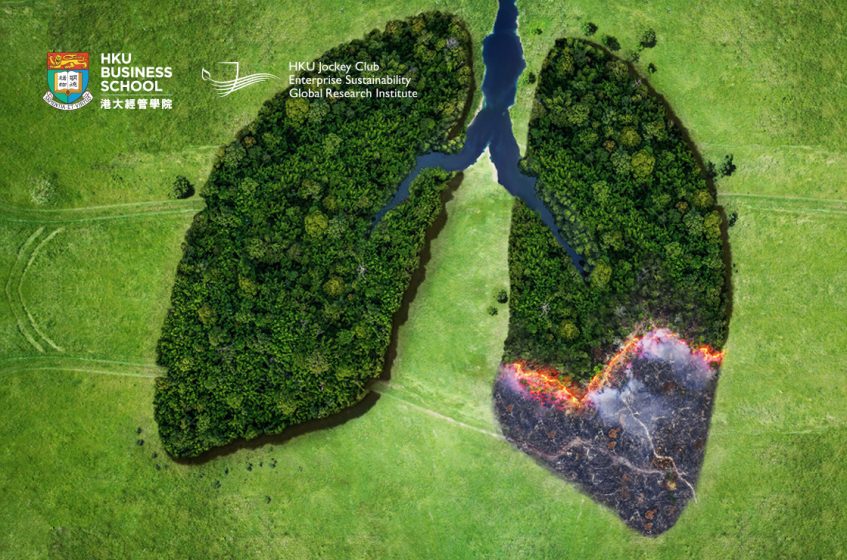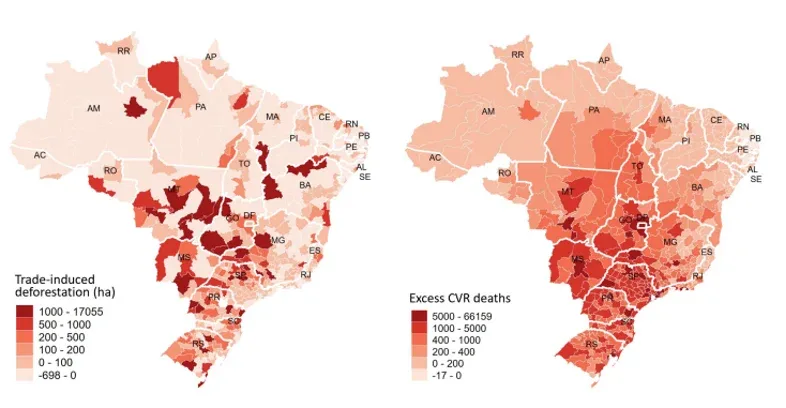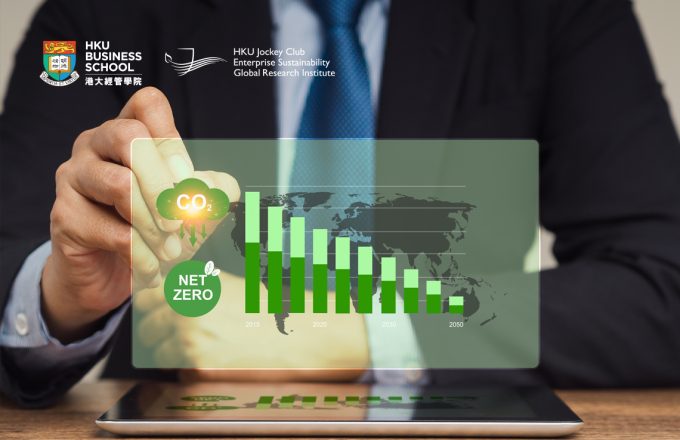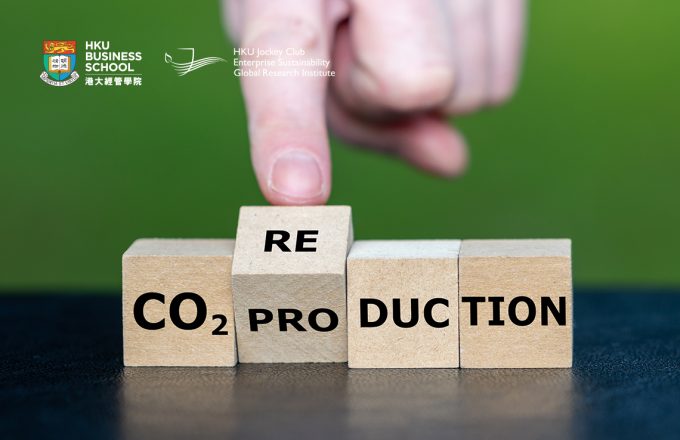
Trade, Trees, and Lives
- The agricultural export value of Brazil has quadrupled over the last two decades due to rising global demand.
- Brazil’s agricultural export boom drives deforestation: between 1997 and 2019, trade-induced agricultural expansion led to the loss of 3.6 million hectares of forest.
- Trade-induced deforestation causes severe health consequences: it results in over 700,000 premature deaths, primarily from cardio-respiratory diseases linked to pollution from deforestation in upwind areas.
- The economic cost of these deaths is estimated at $513 billion USD—about 18% of Brazil’s total agricultural export value during the same period.
- These findings highlight the negative health impacts of trade-induced deforestation and the resulting regional inequality, because mortality costs and economic benefits are not always shared by the same populations.
Source Publication:
Xinming Du, Lei Li, and Eric Zou, “Trade, Trees, and Lives,” SSRN Working Paper, November 2024.
Brazil has emerged as a global leader in agricultural exports, supplying soybeans, sugar, and beef to meet rising demand in countries such as China, the US, and those across Europe. This rapid growth, however, has been underpinned by the widespread destruction of vital ecosystems such as the Amazon Rainforest and the Cerrado. To clear land for farming and cattle grazing, slash-and-burn deforestation remains a common practice, resulting in significant environmental degradation.
Forests play a crucial role in regulating the planet’s health. They absorb greenhouse gases, act as carbon sinks, filter pollutants such as sulfur dioxide and nitrogen oxides, and influence local weather patterns by moderating rainfall and temperature. When forests are destroyed, the pollutants they once trapped are released into the atmosphere, traveling far beyond their source and causing harmful effects on populations in distant regions.
Although the ecological consequences of deforestation are well documented, its direct impact on human health has received less attention. A 2024 study by Du, Li, and Zou quantifies this overlooked crisis, revealing the severe health and economic costs of trade-driven deforestation in Brazil.
The study highlights a clear relationship between Brazil’s agricultural exports and deforestation. Using a shift-share research design, the authors isolate the causal effect of global demand shocks on forest loss. They find that for every 1,000 BRL increase in export value per capita, forest cover declines by 0.174 percentage points, whereas farmland expands by 0.214 percentage points.
Between 1997 and 2019, trade-driven agricultural expansion resulted in the loss of 3.6 million hectares of forest in Brazil. This forest loss underscores the direct trade-off between economic growth and the depletion of irreplaceable natural resources.
Figure 1. Distribution of Trade-Induced Forest Losses and Excess Deaths

Notes: The map on the left shows the spatial distribution of trade-induced deforestation over 1997–2019. The map on the right shows the spatial distribution of the downstream cardio-respiratory deaths due to trade-induced deforestation.
Deforestation impacts go beyond the areas where trees are felled. The authors employed a dynamic area-of-effect (AoE) model to track how pollutants released from deforested regions spread to distant areas, significantly degrading air quality, particularly in cities downwind of deforestation hotspots. The resulting air pollution has been linked to a sharp increase in cardio-respiratory diseases.
The study finds that with each standard-deviation decrease in forest cover, particulate matter (PM10) concentrations rise by 65 µg/m³—tripling pollution levels in affected regions. This surge in air pollution is associated with an additional 0.37 cardio-respiratory deaths per 100,000 people, underlining the severe health risks posed by deforestation-induced pollution.
The health toll was staggering: From 1997 to 2019, trade-driven deforestation resulted in more than 700,000 premature deaths, primarily from cardio-respiratory diseases linked to deforestation. Beyond the human cost, these deaths impose a significant economic burden. Using the value of statistical life (VSL) framework, the study estimates the financial loss at $513 billion—approximately 18% of Brazil’s total agricultural export value during the same period.
The findings of this study shed light on the unsustainable trajectory of Brazil’s agricultural model, which prioritizes short-term economic growth over long-term environmental and public health stability. The need to incorporate environmental externalities—such as deforestation and public health impacts—into Brazil’s trade and environmental policies is urgent. This incorporation is crucial for promoting sustainable practices and ensuring future economic growth does not come at the expense of ecological health and public well-being.
However, achieving this balance is not simple. One of the key challenges lies in the spatial inequality between those who benefit from deforestation and those who bear its costs. Pollutants originating in deforested regions often travel vast distances, impacting urban populations that have little or no direct stake in agricultural exports. This disconnect complicates the design of policies that can equitably address both economic development and public health needs. A comprehensive rethinking of policy frameworks is needed—one that reconciles the competing demands of economic growth, environmental sustainability, and human well-being across different regions.







